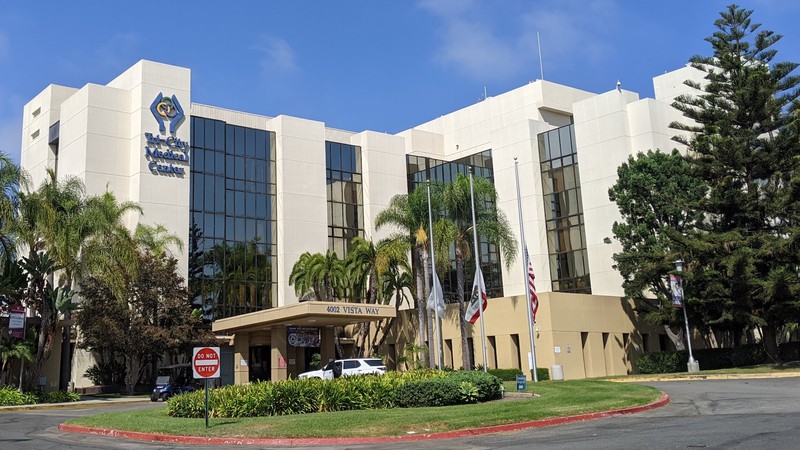Nearly $300 million in interest-free loans will go to the 17 struggling healthcare facilities.

Tri-City Medical Center in Oceanside is set to receive $33.2 million in state interest-free loans. Alan Islas / Wikimedia Commons C.C. 4.0 Share-like License
BY , CalMatters
Seventeen financially distressed California hospitals — including three that filed for bankruptcy earlier this year — will receive close to $300 million in interest-free loans, state officials announced Thursday.
Madera Community Hospital, which closed its doors in January, stands to receive the biggest chunk, $52 million. The money comes from the Distressed Hospital Loan Program, which the Legislature created to support rural and independent hospitals that faced financial challenges coming out of the COVID-19 pandemic.
“The hospitals approved for this program have shown a detailed plan for financial recovery and these funds will help them keep the doors open so they can keep serving their communities.”
STATE TREASURER FIONA MA
The Madera hospital had requested $80 million, but the money it received is expected to be enough to fund a reopening for the rural hospital about 25 miles north of Fresno.
Madera will initially receive $2 million to cover immediate operating costs. Officials at Adventist Health and Madera Community will have to submit a “comprehensive hospital turnaround plan” and, if approved, will then become eligible to receive the remaining $50 million.
“This financial assistance is an important step in the right direction to help Madera Community Hospital reopen its doors to the community. We have more work to do, but I’m proud to have led this effort,” said Assemblymember Esmeralda Soria, a Fresno Democrat whose district includes Madera and who authored legislation that led to the loan program.
Beverly Hospital, located east of Los Angeles, will receive $5 million to cover operations while it is in bankruptcy. The hospital applied for $35 million, but it is now set to be bought by Adventist Health White Memorial. A bankruptcy judge last week approved Adventist’s $39 million purchase of Beverly.
Another bankrupt hospital, Hazel Hawkins Memorial, will receive the $10 million it requested. It’s the only source of emergency care in San Benito County, a rural community east of Monterey.
“The hospitals approved for this program have shown a detailed plan for financial recovery and these funds will help them keep the doors open so they can keep serving their communities,” said State Treasurer Fiona Ma, whose office is helping administer the funds. Ma said her team has already begun providing instructions and assistance to the awarded hospitals.
Biggest Loans to Distressed Hospitals
The Department of Health Care Access and Information reviewed applications and selected hospitals for the program. Thirty hospitals applied for loans.
Other hospitals that will receive significant funding include:
Vulnerable California Hospitals
Most California hospitals are part of large networks that can navigate turbulent financial periods. A number of community and independent hospitals have struggled for years, especially after the peak of the pandemic. Some recently reduced services or laid off staff.
Hospitals have pointed to a number of factors for their distressed state — increased labor costs, and inadequate reimbursement from public insurance programs, Medicare and Medi-Cal, and in some cases private insurance.
The Distressed Hospital Loan Program closes at the end of 2031. Hospitals will get an 18-month grace period and then will have to repay loans over a six-year period.
Some hospitals began to ask the state for help late last year, but the closure of Madera Community Hospital prompted more urgency from lawmakers. It shut its doors after Trinity Health, a large Catholic health system, pulled out of negotiations to purchase the hospital.
Madera Community Hospital in the San Joaquin Valley was the only general acute care hospital in the county of about 160,000 people. The closest emergency rooms are about 30 and 40 minutes away in Fresno and Merced.
The Distressed Hospital Loan Program closes at the end of 2031. Hospitals will get an 18-month grace period and then will have to repay loans over a six-year period.
Supported by the California Health Care Foundation (CHCF), which works to ensure that people have access to the care they need, when they need it, at a price they can afford. Visit www.chcf.org to learn more.
The article titled "California bails out distressed hospitals, offers interest-free loans to 17 troubled providers" appeared first at CalMatters here: https://calmatters.org/health/2023/08/california-hospitals-bailout-loans/
CalMatters is a nonprofit, nonpartisan media venture explaining California policies and politics.